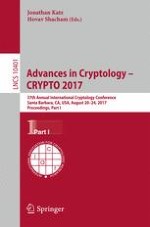2017 | OriginalPaper | Buchkapitel
Generic Transformations of Predicate Encodings: Constructions and Applications
verfasst von : Miguel Ambrona, Gilles Barthe, Benedikt Schmidt
Erschienen in: Advances in Cryptology – CRYPTO 2017
Aktivieren Sie unsere intelligente Suche, um passende Fachinhalte oder Patente zu finden.
Wählen Sie Textabschnitte aus um mit Künstlicher Intelligenz passenden Patente zu finden. powered by
Markieren Sie Textabschnitte, um KI-gestützt weitere passende Inhalte zu finden. powered by
